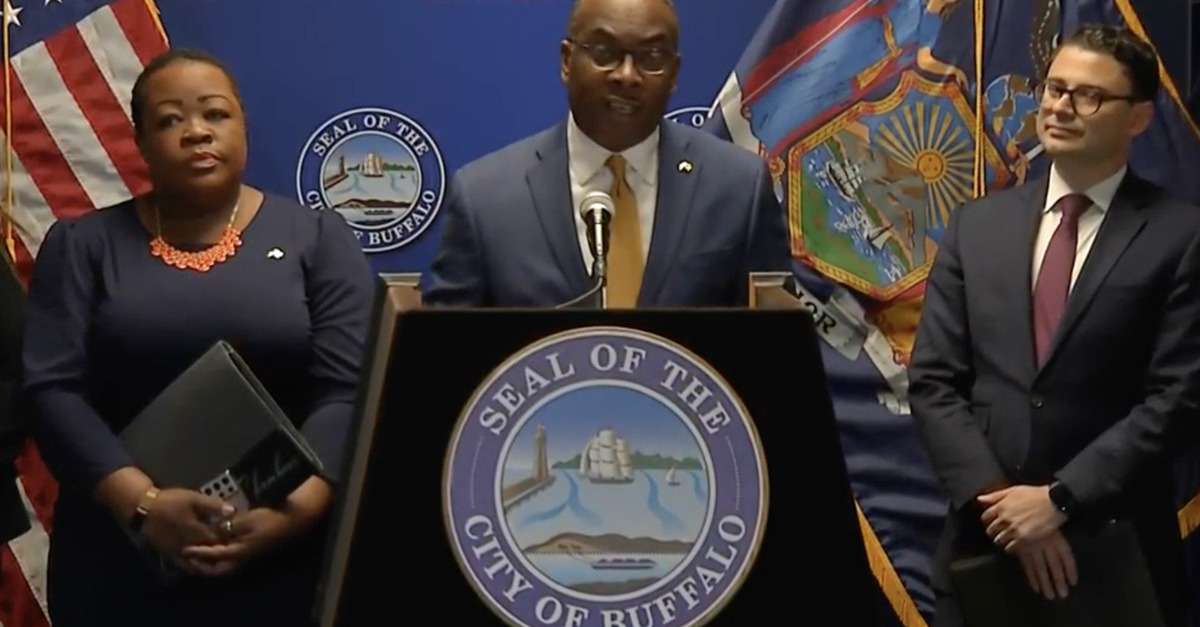
Buffalo Mayor Byron W. Brown announces the filing of a lawsuit against gun manufacturers at a press conference.
A New York State metropolis recently rocked by a racist mass shooting filed a groundbreaking lawsuit Tuesday against multiple gun manufacturers, including Smith & Wesson, Glock, Remington, Sig Sauer, and Beretta. The city of Buffalo, New York, the Empire State’s second-largest city, also sued a host of “ghost gun” manufacturers, referring to homemade gun kits that produce difficult-to-trace firearms without serial numbers.
Filed in New York state court in Erie County, the 197-page complain seeks to hold gun companies accountable for creating gun violence that constitutes a “public nuisance,” as well as for violation of multiple New York state business regulations.
Buffalo mayor Byron W. Brown called the lawsuit the “first of its kind” in a press conference Tuesday.
In a written statement, Brown also alluded to the racist mass shooting that killed 10 Black men and women at a Tops grocery story in his city:
Members of our community have suffered too much and for too long from gun violence. We must do everything we can to decrease gun violence. Enabling the possession of illegal guns destroys lives and deeply effects our neighborhoods, especially in Black and Brown communities. I am proud to stand up to the gun industry and fight for the safety of people living, working, and visiting the City of Buffalo.
Buffalo alleges that the gun companies “are aware that criminals are an important segment of the gun industry market,” but “do nothing” to restrain the marketing of guns to criminals. It adds that because New York State has tough gun laws, “a significant percentage of handguns that have been used in crimes in New York have historically originated in states that have weaker gun laws.”
The city argues the gun manufacturers’ conduct is “entirely at odds with… reasonable policies and practices” required by state business laws.
The lawsuit comes just months after Buffalo suffered a terrorist attack at a supermarket which killed 10 people and injured three others. In May 2022, 18-year-old Payton S. Gendrom live-streamed the attack before he was taken into custody and subsequently charged with multiple counts of first-degree murder, domestic terrorism, and hate crimes. Gendrom later pleaded guilty to all state charges. Gendrom used a Bushmaster XM-15 in the attack, which is the same model used by the shooter in the 2012 mass shooting at Sandy Hook Elementary School in Connecticut.
Buffalo’s legal theory, however, relies on far more than a single mass shooting to support its claims. The city included a multitude of specific examples of tragic gun deaths which ranged from domestic violence cases to the Sandy Hook massacre, to individual homicides, suicides, and accidental deaths. The complaint noted that “2020 was only the second time ever there were over 24,000 gun suicides,” and that in the same year, “Firearms were the leading cause of death for children and teens ages 1-19, prematurely taking the lives of 4,357 young people.” The city says that the named defendants, “caused, maintained, and/or contributed to this crisis for their own profit, and must be held accountable.” Not only does the gun industry’s practices create “a public nuisance that unreasonably interferes with rights common to the general public,” argues the City, but they also strain the already scarce law enforcement personnel who are trying to combat the problem.
As Buffalo points out in its complaint, an entity creates a “public nuisance” when its conduct “offend[s], interfere[s] with or cause[s] damage to the public in the exercise of rights common to all, in a manner such as to offend public morals, interfere with use by the public of a public place or endanger or injure the property, health, safety or comfort of a considerable number of persons.”
Nuisance actions have historically been used to hold companies accountable for things such as the creation of water pollution or toxic fumes; the use of the theory to combat gun violence is novel effort to go after the firearms industry. However, in recent years, plaintiffs in several jurisdictions have used the public nuisance theory to attempt to hold gun manufacturers responsible for gun deaths.
The use of nuisance law in this manner was specifically authorized in the Empire State by a July 2021 bill passed by the New York legislature. The bill, which has yet to be signed into law, “restores the ability of the state and localities to bring civil liability actions against firearm manufacturers and sellers for their own bad conduct,” according to New York State Attorney General Letitia James. Gunmakers challenged the law in federal court, but lost when a federal judge ruled that it did not violate the Second Amendment.
In addition to the nuisance claims, Buffalo alleges that the gun industry violated several portions of the Empire State’s business regulations that prohibit deceptive or dangerous business practices. A similar theory focusing on gun companies’ marketing efforts was used by families of Highland Park shooter victims in an Illinois lawsuit.
Buffalo seeks unspecified compensatory, punitive, and treble damages as well as attorneys fees from the defendant companies.
New York State also joined a separate lawsuit which was filed against Glock last August by the victim of a shooting on the New York City subway. That lawsuit also claimed that the gunmaker violated state business laws.
“We are proud to represent the City of Buffalo,” said attorney Hunter Shkolnik, who represents the City of Buffalo, in an email to Law&Crime Wednesday, “We will work hard to hold these Defendants responsible for their actions. Gun violence needs to stop and we can no longer allow illegal guns to get into the wrong hands.”
Law&Crime reached out to a number of the gun company defendants Wednesday, but received no response.
[screengrab via WKBW]
